Pregnant and breastfeeding — your diet requirements and considerations.
Growing a baby and then breast feeding are two very energy consuming acts on their own, and for mothers who have babies close in age, they might be breastfeeding one bub while pregnant with another.
Your energy requirements are significantly higher when breastfeeding, you need to consume more food and water when breastfeeding because you are not just feeding yourself but your beautiful growing bub.
It is a myth that you cannot get pregnant while breastfeeding - while it is harder to conceive, it is not a form of contraception by any means. While you are exclusively breastfeeding, usually your body will not ovulate, but once you start introducing solids even if continuing to breastfeed, ovulation can start without regaining a period.
The standard recommendation is to increase daily energy needs while breastfeeding by ~500 calories per day compared to pre pregnancy energy intake - you should seek individualised advice with your nutritionist to get more personalised advice but mostly, your diet won’t change too much if you become pregnant while breastfeeding. The same principles apply for food and water intake, but there are certain nutrients that you might want to pay attention to:
Iron - Iron is a mineral that is not dependant on maternal stores for intake in breastmilk - your baby will get most of it’s iron stores postpartum (especially if you delay cord clamping), and your breastmilk will have iron for your baby regardless if you have enough iron for yourself. For a pregnant women, it is most important to include iron rich foods such as grass fed beef, lamb, lentils, eggs, sardines, and green leafy vegetables (wilted of lightly steamed with a squeeze of citrus juice helps your body absorb more iron from plant based sources) as having enough iron will help your energy levels and mental health. It is very important to get a blood test before supplementing with iron, it’s best to work with a practitioner for this.
Zinc - Breast milk zinc levels are transferred directly from maternal zinc stores so this one is super important to keep on top of. Zinc is essential for your immune system, wound healing, mental health, and many genetic pathways for DNA and protein synthesis. Food sources of zinc include oysters, pumpkin seeds, eggs, oats, beans, whole grains and red meat.
Vitamin D - Vitamin D has a positive effect on the immune system, is essential in maintaining a balance of calcium in the body, and can offer protection against gestational diabetes through insulin production. It is recommended to have exposure to appropriate sunlight 3 times per week, 10-15 minutes between 10am-2pm is sufficient, as well as dietary sources from oily fish, mushrooms exposed to sunlight (putting them in the sun for 30 minutes can increase their vitamin D status even more, incredible huh!), eggs (yolk is where the Vitamin D lies) and cod liver oil. This is an essential nutrient for a growing baby and a really important one to get on top of.
Some women will decide to wean their child before the newborn arrives, and others will choose to tandem feed both their children. Sometimes because breastmilk changes taste during pregnancy, children will self wean. It is important that if tandem feeding, the newborn receives the priority to the breastmilk - some mums choose to allocate a breast to each child whatever you choose to do that is right for your family, I would highly recommend seeking a lactation consultant to address any individual questions you have.
Generally, it is most important to eat a balanced diet, rich in nutrients essential for pregnancy and ensure you are getting enough from your diet to keep up with the demands of growing a baby, feeding another child and caring for yourself. A Mediterranean Diet with an abundance of fresh fruit and vegetables, whole grains, oily fish and lean meats is my go-to for a healthy, balanced lifestyle. Oh and of course - hydrate! 2 -2.5L of water daily (herbal teas are mostly included in this unless they have a diuretic effect).
Are you currently breastfeeding and pregnant and wanting personalised nutrition advice? Book in a consultation with me here and we can see how best to support you.
